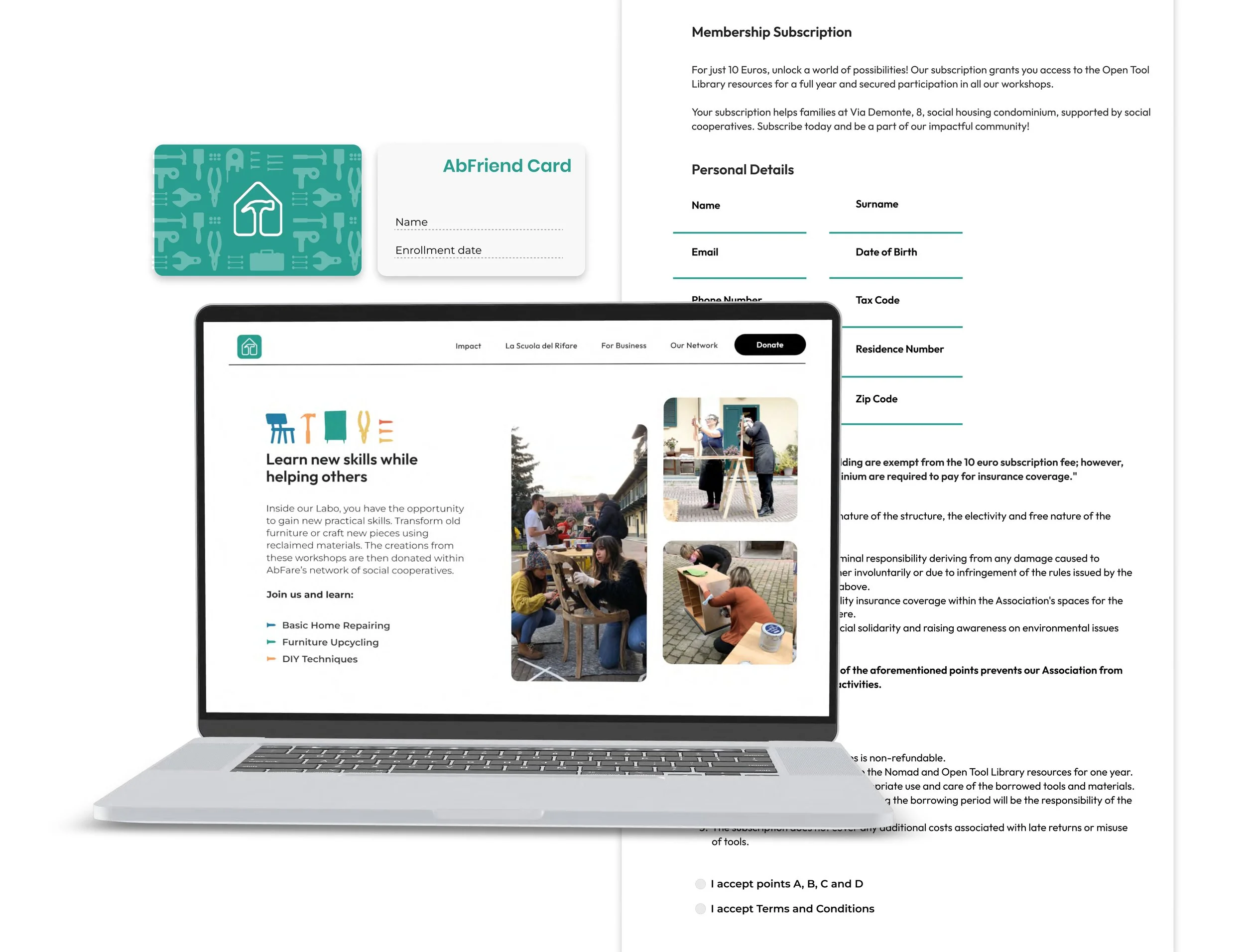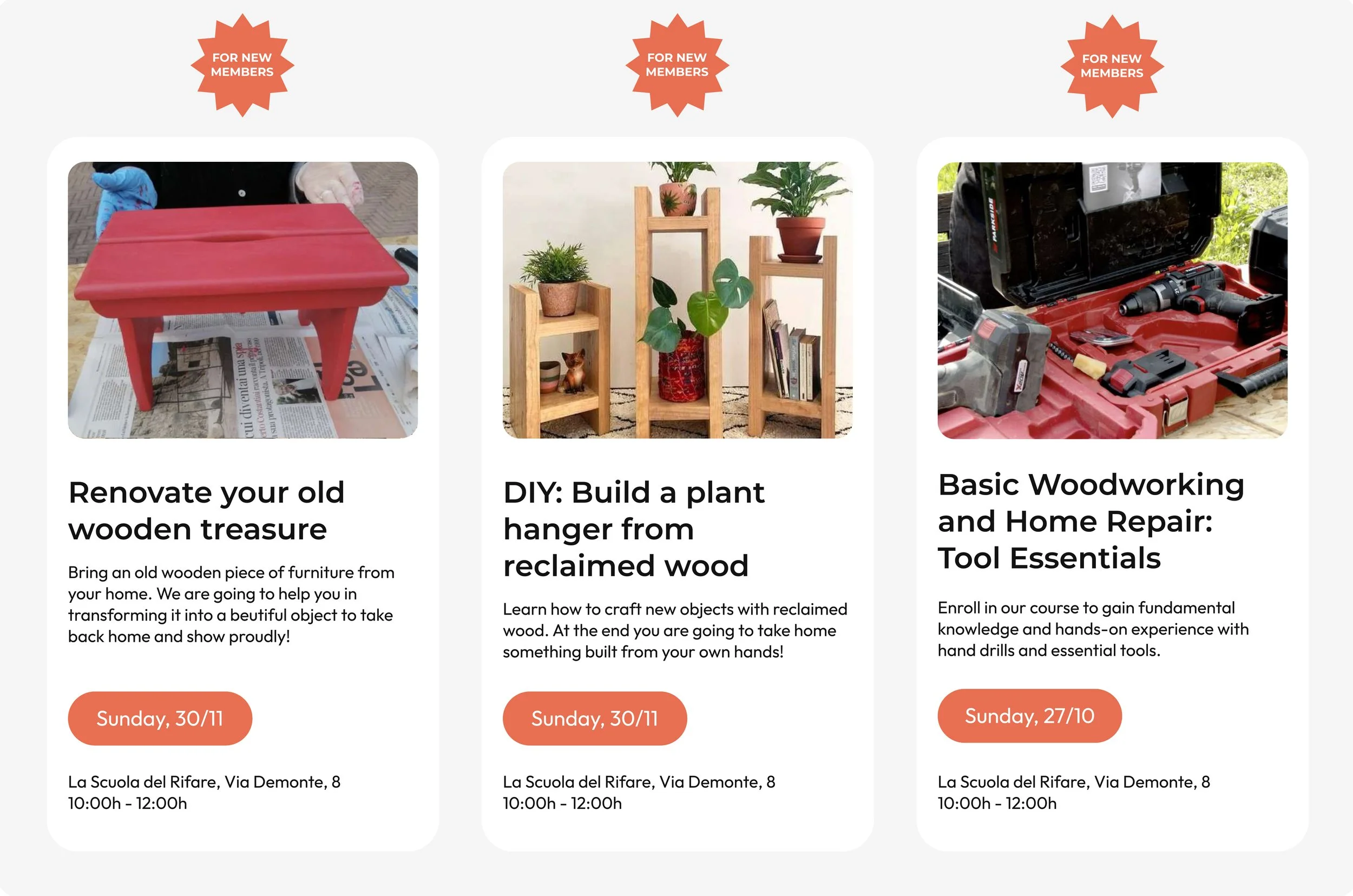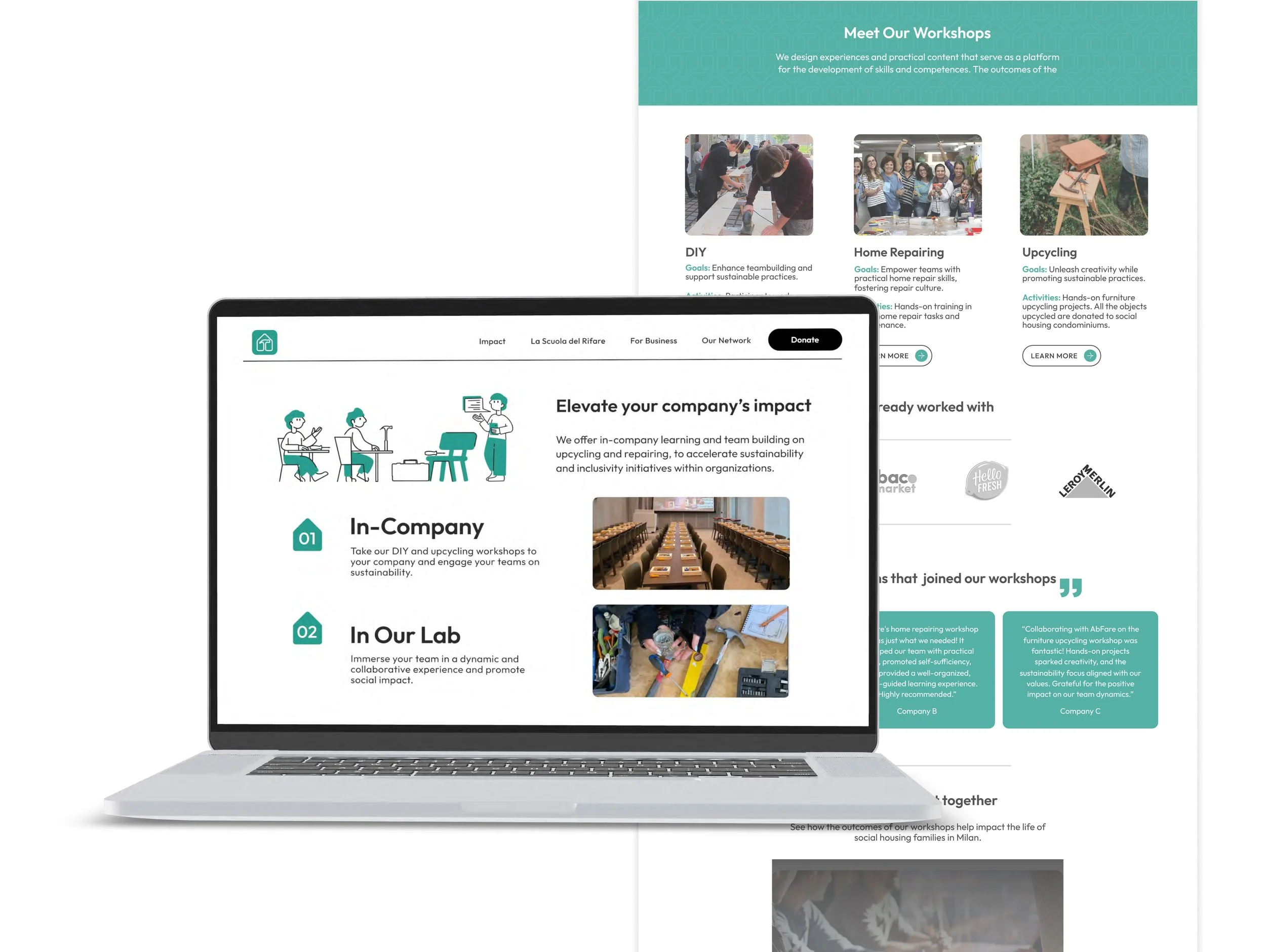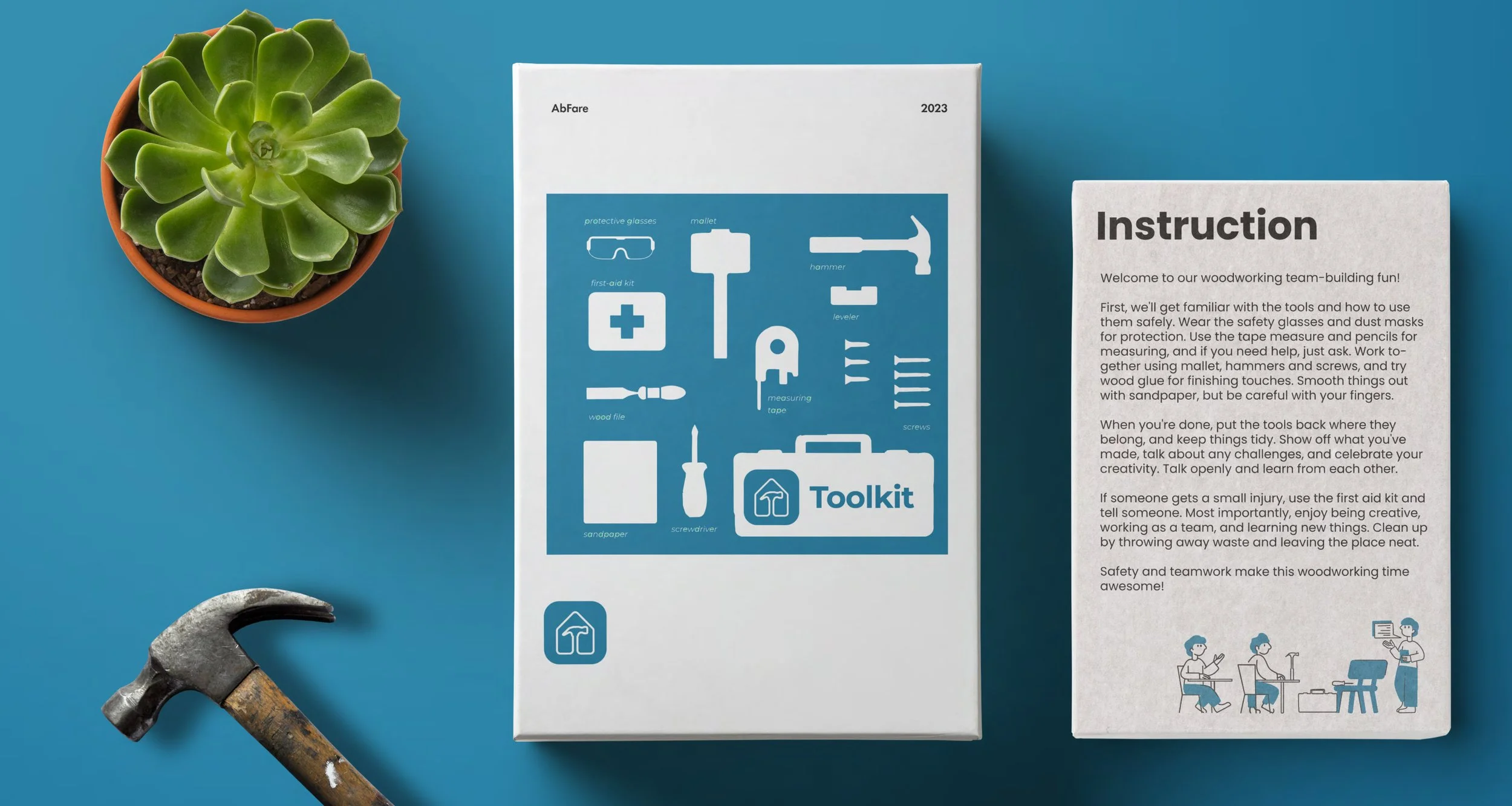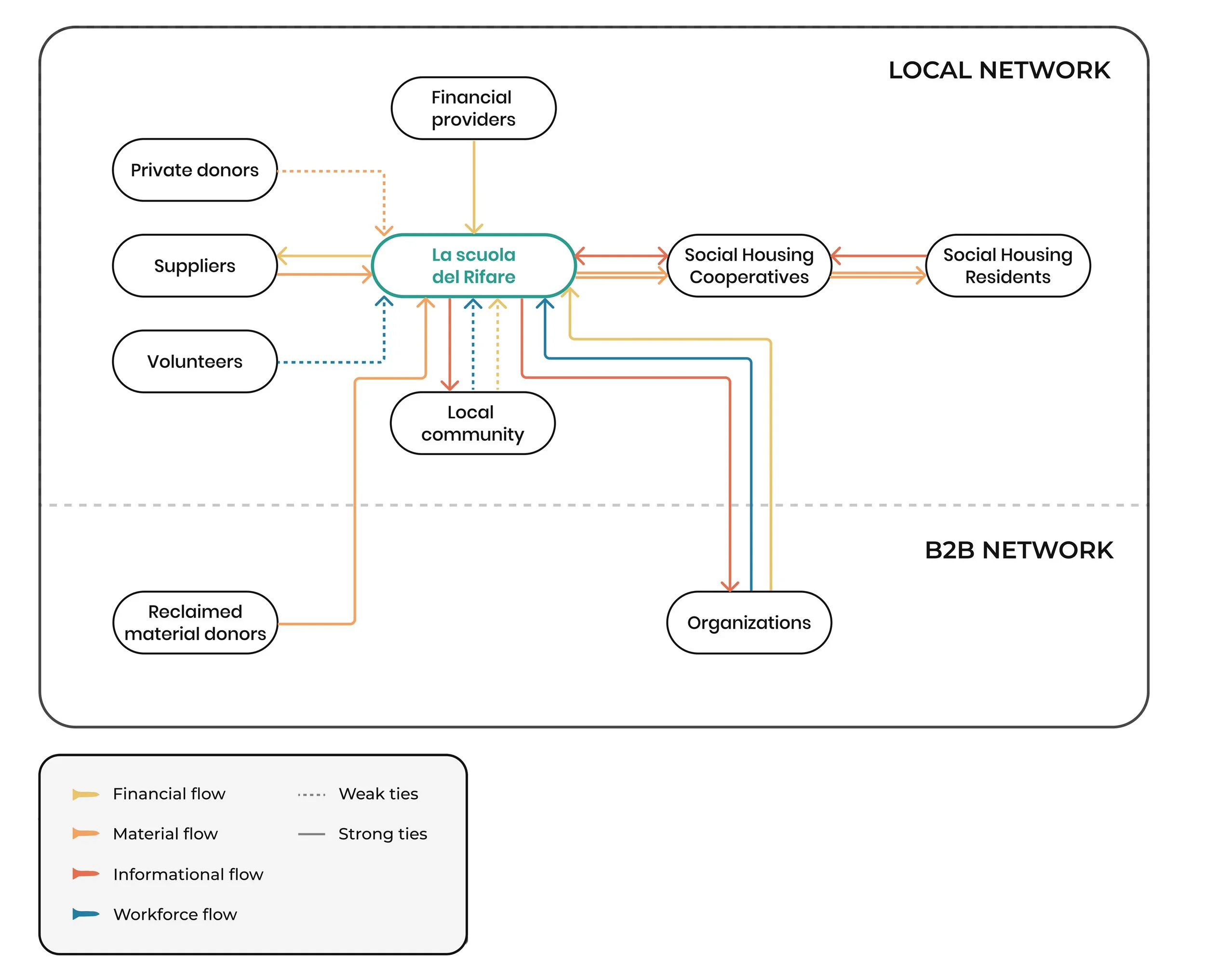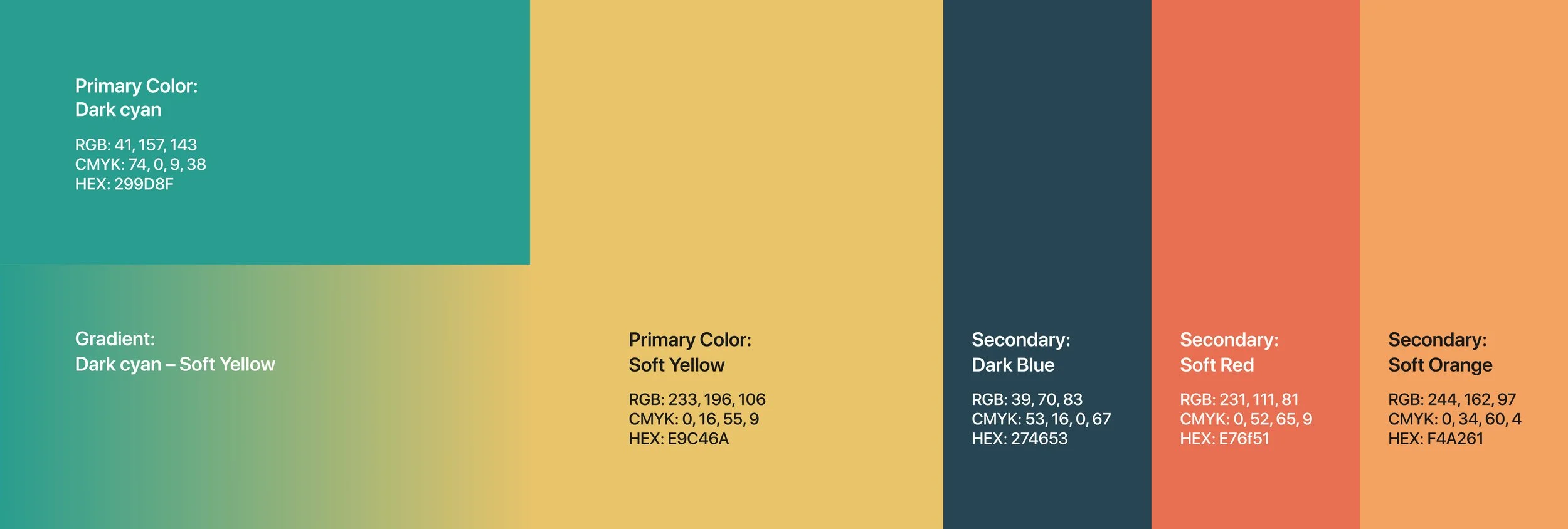La Scuola del Rifare.
La Scuola del Rifare.
This project, part of the PSSD Final Synthesis Studio at Polimi, focused on transforming urban spaces through service design solutions that create value for citizens and enhance the experience of places within complex service ecosystems.
Rooted in the urban context of Niguarda, Milan, the project aimed to accelerate AbFare’s growth by developing a clear identity and robust business plan. It drew on the strong connections between third-sector associations, the Milan Municipality, and the local community. Using an iterative design process—combining research, hypothesis validation, and systemic testing—the team collaborated with AbFare, key stakeholders, and Politecnico di Milano’s academic community through interviews, field visits, and co-creation workshops.
The outcome, “La Scuola del Rifare,” is an upcycling ecosystem that connects Niguarda’s community with third-sector and private organizations. It aims to benefit social housing residents, reduce waste, and generate collective value. This initiative demonstrates the potential of small-scale projects to catalyze systemic change, fostering partnerships across sectors and redefining community engagement in Milan. It also aligns with the circular economy paradigm, offering a model for sustainable urban renewal.
AbFare is an association transforming living environments by promoting waste reduction and circular economy principles through the reuse and redesign of furniture and objects. Their initiatives foster skill-sharing and create renovation ecosystems in social housing, condominiums, and communities.
Collaborating with citizens, housing cooperatives, and other stakeholders, AbFare offers consultancy, workshops, recovery services, and artisan-led courses.
Project Overview & Approach.
Who is AbFare?
Mission.
Improve living spaces in social housing condominiums around Milan through hands-on activities that foster values of craftsmanship, reuse, and recycling.
Location.
In September 2023, AbFare transitioned from a nomadic project to a permanent space at Demo3 in Via Demonte, Prato Centenaro-Niguarda.
Sharing a co-working space with three other social impact organisations, Demo3 is funded by “Milano a 15 minuti” and embodies the “15-minute city” concept. It serves as a hub for the third sector, promoting sustainability, community engagement, and social impact.
After two years, AbFare remains in its early stages, navigating challenges such as forming key partnerships, engaging social housing residents, and defining a sustainable business model. With limited funding and its founders balancing other commitments, the initiative has struggled to fully activate its potential within the local community.
However, joining Demo3 marked a pivotal moment. This collaboration with other third-sector organizations offers AbFare an opportunity to build a strong network and work systematically with housing cooperatives to directly engage social housing residents. By leveraging these partnerships, AbFare aims to overcome community involvement challenges and amplify its impact.
Project Overview & Approach.
Problems & Opportunities.
Problems.
-Limited partnerships with key organizations (e.g., AMSA).
-Low engagement from social housing residents.
-Undefined business model and minimal funding.
Opportunities.
-Collaboration with Demo3 to expand its network.
-Systemic partnerships with housing cooperatives to engage residents.
-Developing a distinct identity and solid business plan for growth and recognition.
Creating a local system and a sharing platform to support the distribution of recovered furniture.
Project Overview & Approach.
The Challenge.
This project aims to create a local system and sharing platform that promotes circular economy principles while supporting social housing families. By integrating community dynamics, fostering cross-sector collaborations, and facilitating resource and knowledge sharing, the initiative seeks to drive sustainable change starting at the neighborhood level.
Research. The project began with a comprehensive literature review and analysis of case studies. Research extended throughout the process, including 10 in-depth interviews and 6 field visits. Stakeholders and experts in housing, circular economy, community engagement, and social impact were interviewed in Italian, both in-person and online, using a semi-structured format.
Ideation. The ideation phase involved collaborative sessions with AbFare and key stakeholders, supported by expertise from the academic community at Politecnico di Milano. Four co-creation workshops were organized to generate, prioritize, and refine service and business ideas aligned with the project’s objectives.
Testing. The testing phase focused on prototyping and iterating user journeys and service touchpoints. User personas, developed from earlier insights, were used in role-playing exercises with actors to refine these journeys. A website prototype was tested with 9 participants, gathering feedback to improve the user experience.
Project Overview & Approach.
Methodology.
Project Overview & Approach.
Process.
For an insight into the behind-the-scenes of our process.
Service Solution.
The Service Statement and Purpose.
“La scuola del Rifare” is an upcycling ecosystem that unites the local community of Niguarda with third-sector and private organizations in Milan by sharing knowledge and circulating materials, tools, and resources, to benefit social housing residents, reduce waste, generate awareness and collective value.
Vision.
“La Scuola del Rifare” operates under the governance of a non profit organization with income generating activities.
Its ultimate vision is to become the focal point for the culture of furniture reuse and repair for social purposes in the Milano Niguarda area.
Mission.
Engage the local community through awareness raising and specific training on the purpose.
Build a network of partners to whom to offer services that generate collective value that can be communicated in a concrete and transparent way.
Social Value Proposition.
Fostering a culture of reuse and repair within the local community.
It involves implementing concrete projects in favor of local social housing and contributing to the construction of third-party social value.
Service Solution.
Offering.
La Scuola del Rifare operates with a dual-service model, targeting both local residents and businesses.
—For residents, it offers open courses as the core service, along with a membership program, tool lab access, and monthly donation events.
—For businesses, it provides social team-building activities for Milanese organisations and partners with local producers to collect reclaimed materials on-demand.
Core Offering.
The Open Courses.
The open courses are scheduled twice a month, typically on weekends, at AbFare’s Labo or in the courtyard.
These courses fall into two main categories: donation-oriented and network-oriented. The donation-oriented courses aim to both share knowledge and create social impact. The primary course focuses on teaching furniture upcycling techniques by renovating unwanted pieces from AbFare’s inventory, with the proceeds donated to social housing cooperatives.
Core Offering.
Social Teambuildings.
These sessions provide in-company learning experiences using individual toolkits and pre-cut reclaimed wood, focusing on home repair, essential tool usage, and collaborative small object construction. Alternatively, at AbFare’s Labo in the Demo3 courtyard, teams can engage in a variety of activities, including furniture upcycling with reclaimed materials sourced through their platform.
In both cases, the outcomes of the activities are donated to social housing cooperatives. Participation numbers are flexible, tailored to the specific needs and capacity of each organisation.
The Social Team Building activities are on-demand and can take place either at the organisation’s location or in AbFare’s spaces.
Design Individual Tookits.
Complementary Offerings.
-

The Labo & Memberships.
“The Labo” is AbFare’s primary physical space, available for use by the local community for personal projects during select weekend hours.
Access is granted through an annual membership, which requires a 10€ contribution to cover insurance costs and ensure safety within the facility. This membership is also mandatory for attendees of the courses.
-

The Donation Days.
“Donation Days” are monthly events held in the Demo3 courtyard, where local residents can donate furniture while enjoying food, music, and engaging upcycling activities.
These events take place on the first Sunday of each month and are open to all, regardless of donation. Donors can request assistance with disassembly and transportation by completing donation forms prior to the event.
-

The Reclaimed Material Collection.
The reclaimed material collection is an on-demand service. AbFare establishes partnerships with local stores and producers that can call them whenever they have some surplus raw materials to donate.
AbFare can collect these materials to prevent them from being thrown away and reuse them in their open courses.
Service Solution.
System.
System Map. La Scuola del Rifare operates as a two-fold system where the local and B2B networks interact, mutually reinforcing each other to achieve the initiative’s goals.
The system involves nine main actors exchanging financial, material, informational, and workforce flows, with variable intensity depending on the strength of their relationships.
Within the local network, the material flow of donations to social housing residents is weak. This is due to AbFare’s reliance on private donors and local community volunteer efforts, both of which are unpredictable. Additionally, financial flows from public sponsors alone limit the initiative, as it lacks a stable revenue stream for sustainability.
The introduction of a B2B network addresses these gaps. Partnerships with reclaimed material donors enhance incoming material flows, while offering services to organisations bolsters financial and workforce flows. These improvements ultimately strengthen the material flow of donations to social housing residents, creating a more resilient system.
Stakeholder Map. As AbFare is currently a small organisation, La Scuola del Rifare relies on engaging a broad range of stakeholders to sustain itself.
These stakeholders have been categorised into two main groups: the local network and the B2B network. Each group is further classified according to the following categories.
Service Solution.
Business.
Business Model Canva. La Scuola del Rifare operates under the governance of a non profit organisation with income generating activities, and since that, its business model has been structured following an Hybrid Organisation Business Model Canva.
Financial Flows. The financial model for La Scuola del Rifare relies on multiple funding sources. The initial investment will be covered by AbFare’s existing budget, insurance costs will be financed through membership subscriptions, and recurring expenses will be sustained by public funding and revenue from team-building activities.
Service Solution.
Branding.
Primary Logotype.
Logo Variants.
Primary Typeface.
Secondary Typeface.
Colour Shades & Palette.
Ideation & Prototyping.
Our prototyping process.









